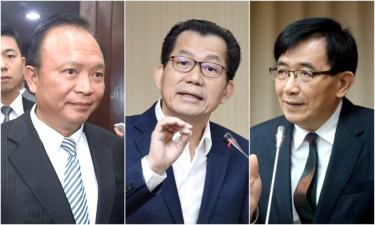Premier William Lai (賴清德) yesterday initiated the first stage of Cabinet reforms after the Democratic Progressive Party’s (DPP) losses in the nine-in-one elections on Nov. 24, approving the resignation of three ministers.
Lai called a Cabinet-level meeting at the Executive Yuan in Taipei to discuss policy reforms, in which he approved resignations tendered by Minister of Transportation and Communications Wu Hong-mo (吳宏謀), Environmental Protection Administration Minister Lee Ying-yuan (李應元) and Council of Agriculture Minister Lin Tsung-hsien (林聰賢).
All ministers were at the meeting except Hakka Affairs Council Minister Lee Yong-te (李永得), who had prior engagements, but had rendered a report on ways to improve his agency prior to the meeting.
After the results of the elections were announced on Sunday last week, Wu, Lee Ying-yuan and Lin had tendered verbal resignations to Lai, and they yesterday again expressed their desire to resign after presenting reports on how to improve their organizations, Executive Yuan spokeswoman Kolas Yotaka told a post-meeting news conference.
They were steadfast in their resolve to resign, as they believed their policies had failed to gain the public’s trust, she said, adding that Lai approved the resignations following the meeting.
From Tuesday, the politically appointed deputy ministers at the three ministries are to take over as acting ministers, Kolas said, adding that the premier would announce their successors in due time.
Lai did not give any instruction after the three-hour meeting, but was to have all the suggestions made by his Cabinet members organized by last night so that he could process the information and personally report to the public in detail at a future news conference how policy reforms would be carried out, she said.
However, he did offer some remarks regarding the DPP’s election rout, she added.
The DPP did not win people’s trust after it became the ruling party for the second time because it failed to think from the public’s perspective, Kolas quoted Lai as saying.
“We admit that our communication with the public was less than ideal and that we were unable to promptly address public complaints,” Lai was quoted as saying.
“It is the shared opinion of all Cabinet-level agencies that the reforms led by the government should be able to give people hope,” he was quoted as saying. “We must realize that it is the government’s responsibility to lessen people’s burden. We must stand by every family through the hardships in their lives.”
“While we [the government] have our core values, we must take a more humanistic approach backed by more humanistic policy explanations, so that people will understand,” he was quoted as saying.
Several ministers also blamed the DPP’s election losses on the administration’s penchant for touting “cold” figures about its achievements, which failed to win the hearts of people, Kolas said.
Additionally, not only had the government been “virtually defenseless and inert” against the dissemination of disinformation, it had also been inept at using popular social media to communicate with the public in their language, she cited some officials as saying.
Before the meeting ended, Lai, seeing that many ministry officials appeared to be frustrated, encouraged them to keep pushing policies that have won the public’s praise, while remediating the ones that need improvement, Kolas said.
Source: Taipei Times - 2018/12/02





















